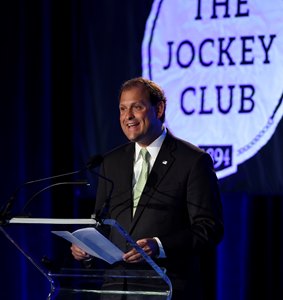Hearing Scheduled on Horseracing Integrity Act


Federal legislation that aims to improve the integrity and uniformity of medication rules, testing, enforcement, and sanctions in horse racing will be discussed June 22 in Washington, D.C.
For the first time since it was introduced in May 2017, the Horseracing Integrity Act of 2017 will receive a subcommittee hearing. The subcommittee on Digital Commerce and Consumer Protection—within the House Committee on Energy and Commerce—is scheduled to meet at 9 a.m. Friday in Room 2123 of the Rayburn House Office Building.
Since being introduced by Rep. Andy Barr (R-Ky.) and Rep. Paul Tonko (D-N.Y.) May 25, 2017, the bill's bipartisan co-sponsors have increased to 118.
The bill would create the Horseracing Anti-Doping and Medication Control Authority, giving it control over the sport's medication and testing issues. Backers of the legislation believe there is too much inconsistency in medication and drug policies and testing under the current state-to-state regulations.
The legislation calls for the end of medication administration within 24 hours of a race. That policy would force changes to the existing widespread U.S. standard of administering furosemide (commonly called Lasix) to prevent or reduce the severity of exercise-induced pulmonary hemorrhage.
The legislation and authority could be terminated if state regulators form a state compact that is consistent with the aims of the Authority. Funding would be generated by an assessment on state racing commissions based on starters.
BloodHorse plans further coverage of Friday's agenda and speakers as they become available.
The following is a bill summary from the Congressional Research Service, a nonpartisan division of the Library of Congress:
This bill establishes the Horseracing Anti-Doping and Medication Control Authority as an independent non-profit corporation with responsibility for developing and administering an anti-doping and medication control program for: (1) Thoroughbred, Quarter, and Standardbred horses that participate in horse races that have a substantial relation to interstate commerce, (2) such horse races, and (3) the personnel engaged in the care, training, or racing of such horses.
The Federal Trade Commission (FTC) shall have exclusive jurisdiction over all horse racing anti-doping and medication control matters. The Authority and such FTC jurisdiction shall terminate if an interstate compact providing for services consistent with such program is established within five years after the program takes effect.
The Authority may enter into agreements with state racing commissions to implement the program within their jurisdictions.
Program elements would include anti-doping and medication control rules, lists of permitted and prohibited substances and methods, a prohibition on the administration of any such substance within 24 hours of a horse's next racing start, and testing and laboratory standards.
The Authority would develop, maintain, and publish such lists; establish a list of anti-doping and medication control rule violations applicable to either covered horses or persons; establish standards and the process for laboratory accreditation and sample testing; and promulgate rules for anti-doping and medication control results management, for the disciplinary process for violation results management, and for imposing sanctions for violations. The bill sets forth civil enforcement provisions.
Activities under this bill are funded by an assessment placed on state racing commissions based on the calculation of cost per racing starter.
